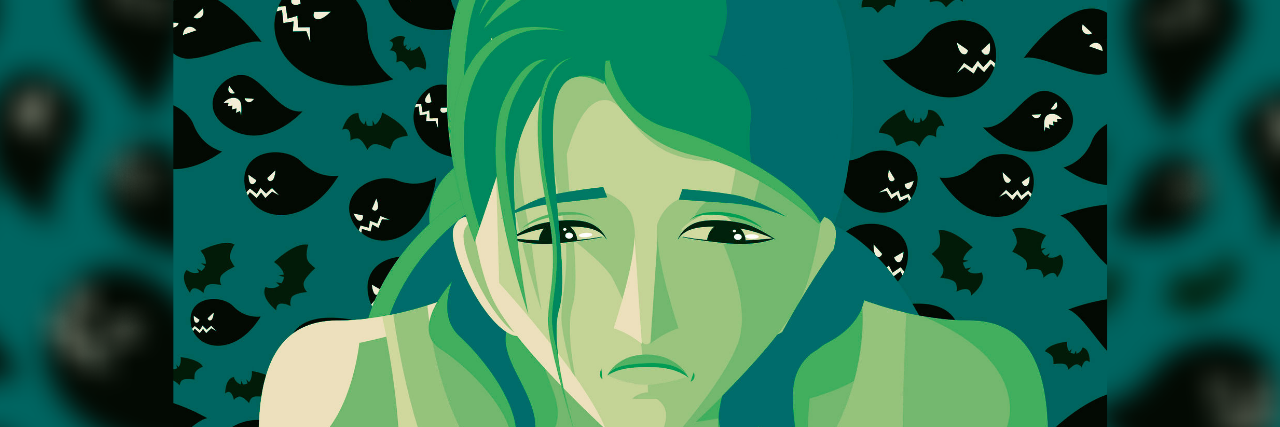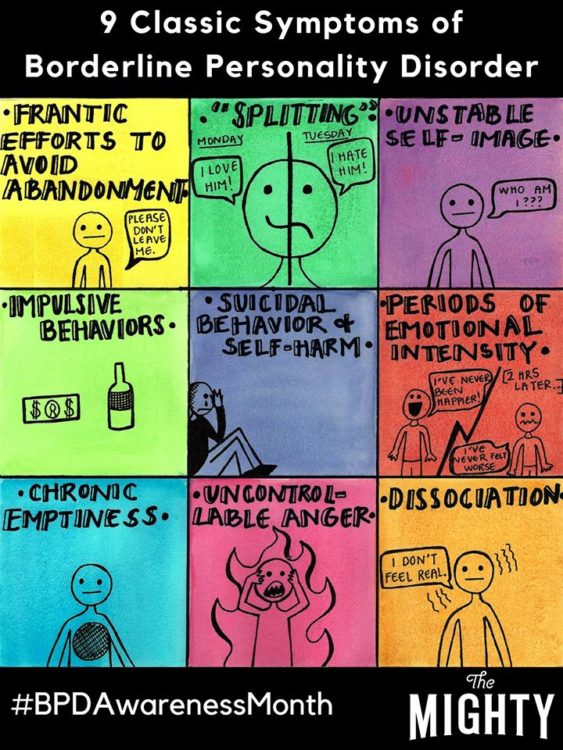If you live with borderline personality disorder (BPD), you’re probably familiar with the nine classic criteria commonly associated with the diagnosis. Symptoms like frantic efforts to avoid abandonment, uncontrollable anger and black-and-white thinking often plague people who live with BPD. To learn more, check out the graphic we created below.
While we tend to focus on the symptoms themselves, we don’t always talk about the one thing that often follows a BPD episode — guilt.
“Borderline guilt” is the feeling of shame following a BPD episode. Sometimes people feel guilt because the way they acted hurt their loved ones. Other times people feel guilt because they acted in a way that doesn’t accord with their personal values.
This is something Mighty contributor Harika Bantupalli has experience with herself. Following an episode of BPD rage, she explained how it felt to wake up the next morning to intense guilt:
The next day, I woke up with an empty feeling in my chest. I couldn’t talk to my parents the way I did previously. I felt ashamed. I knew they were the only ones who would stand by my side… I was scared that our bond has broken a little.
If you’ve ever felt ashamed after a BPD episode, you’re not alone. We wanted to know what “habits” people have when they are experiencing guilt after a BPD episode, so we turned to our Mighty BPD community to share their experiences. Can you relate? Let us know in the comments below.
Here’s what our community shared with us:
1. Pushing Loved Ones Away
“Pushing away healthy supportive people because I felt at the time the behaviors I was displaying were unforgivable. However, through DBT I learned these behaviors can be avoided when the right tools and skills are in place and I learned to be gentle with myself, even after I felt like my behavior was unacceptable.” — Christopher R.
“My last episode I flipped at my Mrs. ( we are long distance and don’t live together). I blocked her on all social media and blocked her mobile number for hours. The guilt afterward was awful. I always shut people out and a lot have stayed away.” — Micky G.
2. Talking “Too Much”
“I talk too much after an episode. I want to keep people close and avoid having to discuss what I’ve done so ramble on and on about pointless things.” — Lorna O.
3. Breaking Up With Your Significant Other
“I often break up with my boyfriend because I know I’m too much to handle and don’t want to hurt him more.” — Sierra B.
“I drive away my boyfriend because I feel so guilty after hurting him because I was splitting. Sometimes when I feel guilty I think I don’t deserve to be in a relationship.” — Yanie R.
4. Feeling Lethargic
“I am incredibly lethargic. It could last for hours to days. It makes me seem incredibly lazy.” — Loren M.
5. Apologizing Again and Again
“I apologize a lot and then shut down and don’t talk to anyone in fear that I’ll say or do something else I’ll regret.” — Stephanie B.
“Apologizing continuously until they say it’s OK because I need the validation and security that they aren’t leaving me.” — Chloe S.
6. Giving Gifts to the Person You Hurt
“After I get angry and lash out, I over-apologize. Like, repeatedly apologizing and offering gifts to compensate for my outbursts. If I feel like the person isn’t accepting of my efforts to make amends I then split on them, treating them as if they mean absolutely nothing. I hate myself for it because I’ve lost important people in my life due to these actions.” — Amy S.
7. Getting “Clingy”
“I get really clingy/needy and childlike. I need extra reassurance and attention and to be told why I’m not a terrible person (in detail).” — Toria W.
8. Isolating
“I isolate myself for a few hours — sometimes longer — because I feel so guilty for how I’ve treated people that I don’t know how to ‘fix’ it. And also because I’m embarrassed for acting the way I did.” — Gina G.
“I isolate myself from everyone. I feel like I’m a horrible person that no one wants to be around so I feel like I’m doing them a favor by staying away.” — ShaVaugn J.
9. Deactivating Social Media
“Ignore my phone, delete my WhatsApp picture, hide my seen status, deactivate my Facebook and basically become un-contactable… then pop back up on everything a few days later as if nothing has happened.” — Georgina H.
10. Cleaning
“The dishes. The kitchen needs to be perfectly clean. Guess I’m trying to wash away the guilt and get rewards for a job well done. I don’t know for sure. I just find myself there not being able to stop” — Jeim T.
11. Bending Over Backwards to Make Everyone Happy
“I overextend myself, trying to make everyone happy and forget what a mess I am. Just to overextend to the point of almost another episode because the disappointment from not receiving the emotion, action or gratitude I hoped to get. It feels like a personal attack that I set myself up for. It’s exhausting.” — Caitlyn P.
12. Shutting Down
“Shut down. I feel so extremely guilty that I’m at a loss of words and I feel like the world is coming to get me and I make myself believe I deserve everything bad that happens to me because it’s my fault for it happening anyways. It usually lasts for a few hours but sometimes it can stretch out into several days — depending on how extreme the breakdown was.” — Kristina J.
13. Reliving an Episode In Your Mind
“’Flashbacks.’ I overthink absolutely everything and blame myself for the way others feel. I also try and avoid situations that could potentially make me have an episode.” — Bridget M.
14. Getting Physically Sick
“I get so sick, vomiting, the shakes, loss of breath etc., I physically cannot move sometimes… I just lay there in a ball and cry.” — Courtney M.
15. Acting Like Nothing Happened
“I act like nothing happened but then do something nice like make a special dinner or buy them something I think they will like to silently make up for it. Mostly so I won’t feel as guilty. I don’t even know if people know that’s why I am doing those things.” — Sarah B.
16. Going “Silent”
“I go sit on my own in silence, thinking about everything that’s happened. I struggle [with] saying sorry and hate how I react sometimes.” — Jay D.
If you’re struggling with BPD symptoms or “borderline guilt,” we want you to know you are never alone — even in the times that feel hopeless. We encourage you to seek out the help of a mental health professional and become part of a dialectical behavior therapy (DBT) group. DBT is the gold standard treatment for people struggling with BPD.
If you don’t currently have access to treatment, we want you to know The Mighty family is here for you. To give and get support from people in our community who really “get” it, we encourage you to post a Thought or Question on The Mighty with the hashtag #BorderlinePersonalityDisorder.
Do you experience “borderline guilt”? Let us know in the comments.
GettyImages photo via MatiasEnElMundo.


